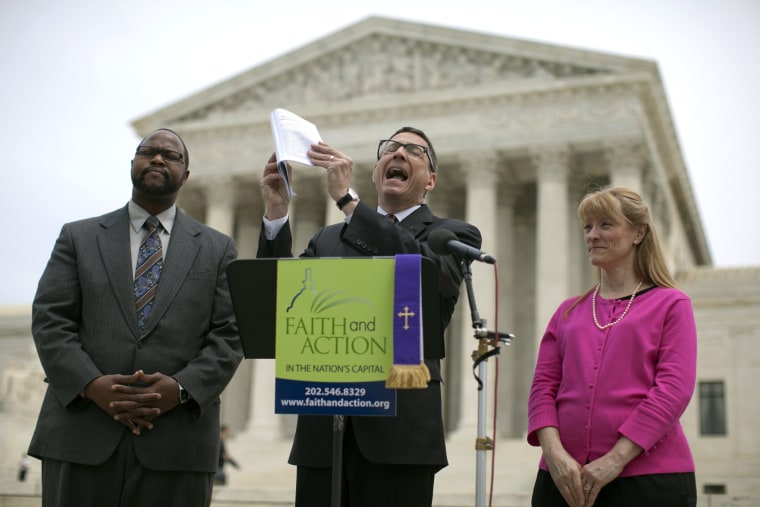The Supreme Court ruling doesn't come as too big a surprise, but for proponents of church-state separation, this morning's decision is nevertheless disappointing.
The Supreme Court on Monday ruled that a town in upstate New York may begin its public meetings with a prayer from a "chaplain of the month." Justice Anthony M. Kennedy, writing for the majority in the 5-to-4 decision, said "ceremonial prayer is but a recognition that, since this nation was founded and until the present day, many Americans deem that their own existence must be understood by precepts far beyond that authority of government to alter or define." In dissent, Justice Elena Kagan said the town's practices could not be reconciled "with the First Amendment's promise that every citizen, irrespective of her religion, owns an equal share of her government."
Let's back up and revisit what this case was all about. At issue are town board meetings in Greece, N.Y., a Rochester suburb, which hosts a "chaplain of the month" before board members begin their official business. Nearly all of the invited chaplains are Christian, and "more often than not," the Christian clergy "called on Jesus Christ or the Holy Spirit to guide the council's deliberations."
This would appear to be out of step with the First Amendment. Americans are, of course, welcome to pray or not as they wish, but for the local government to incorporate Christian prayers as part of the official community meeting was problematic.
Some local taxpayers, Susan Galloway and Linda Stephens, reached out to my friends at Americans United for Separation of Church and State, which filed suit to keep board meetings secular. The 2nd Circuit Court of Appeals ruled unanimously in their favor.
The usual suspects on the high court -- Republican appointees Roberts, Alito, Kennedy, Scalia, and Thomas -- disagreed.
The underlying legal dispute has been litigated before, though the cases weren't identical. Thirty years ago, in a case called Marsh v. Chambers, the Supreme Court cleared the way for legislative prayers, which remain quite common nationwide. But in legislative prayers, members of the public are simply spectators, whereas the public actually participates in town board meetings.
In other words, in Greece, N.Y., government-sponsored Christian prayers are more likely to make Americans feel like second-class citizens in their own community. Under the guise of "ceremonial" religious endorsements, the court majority was unmoved.
The entirety of the ruling is online here (pdf). A statement from the group that filed the case is online here.
Related video:
